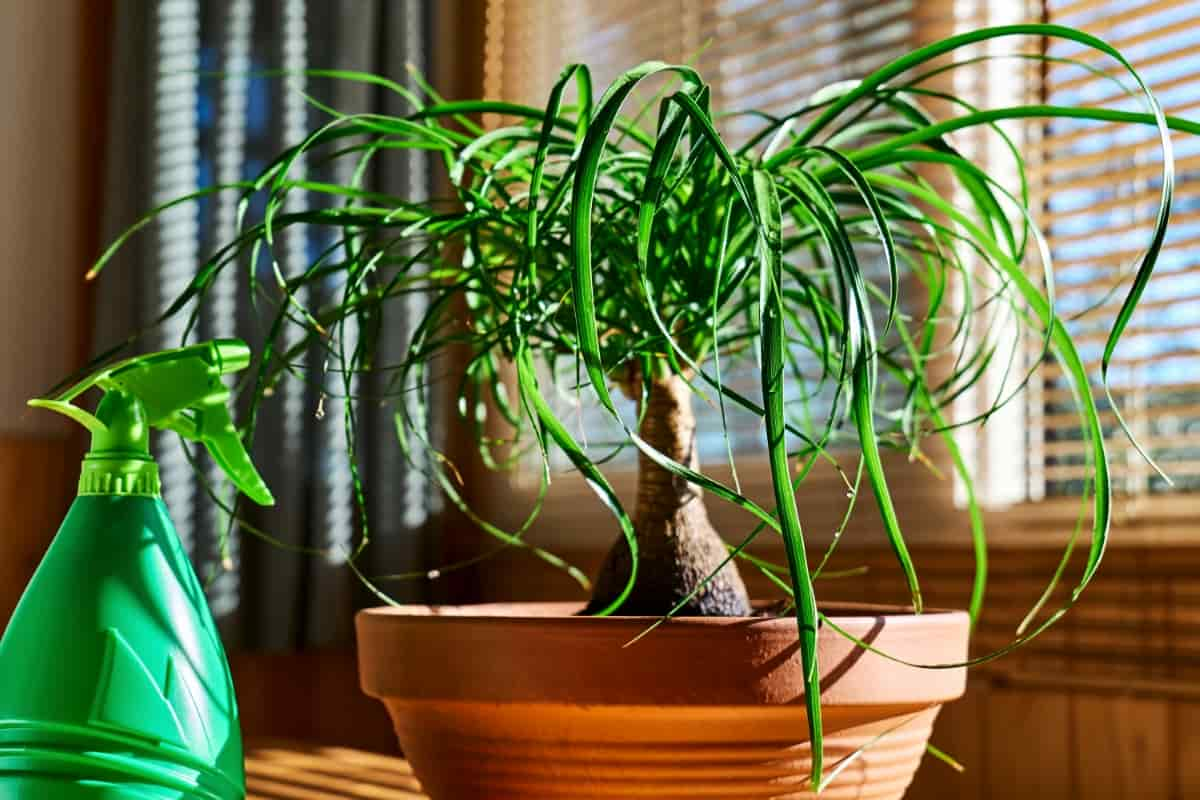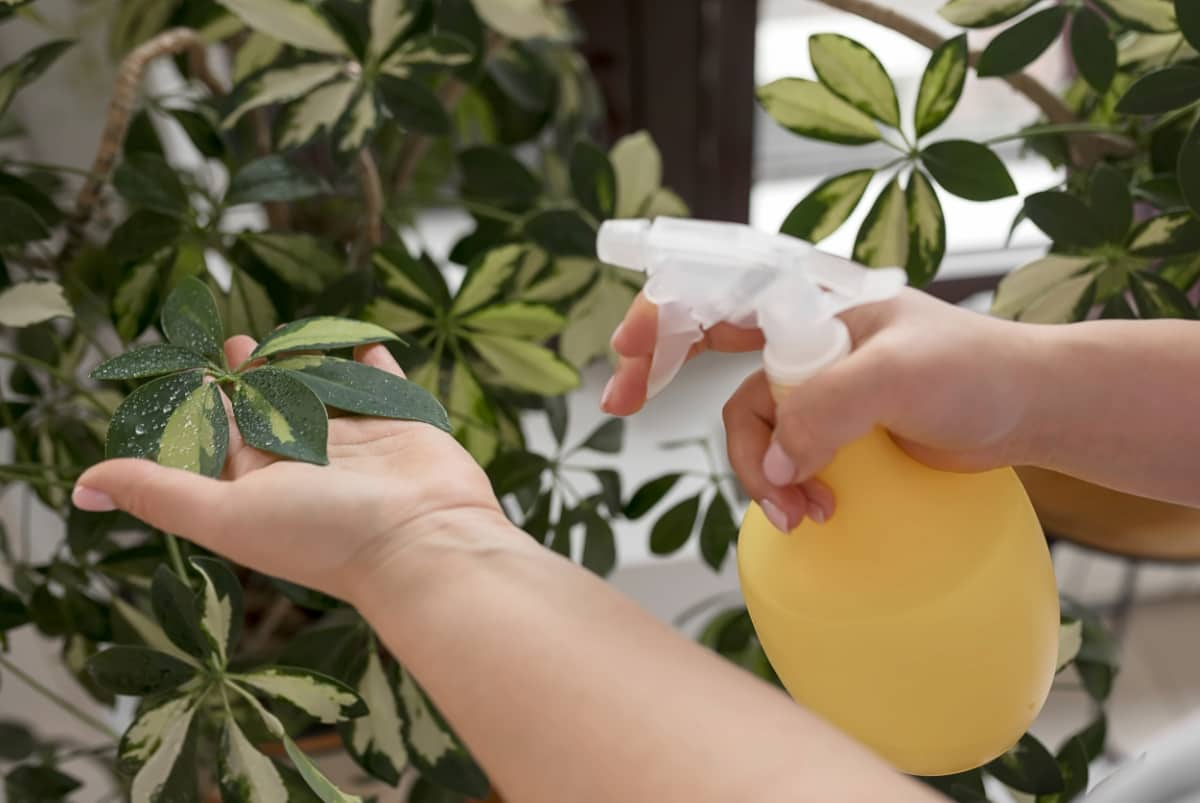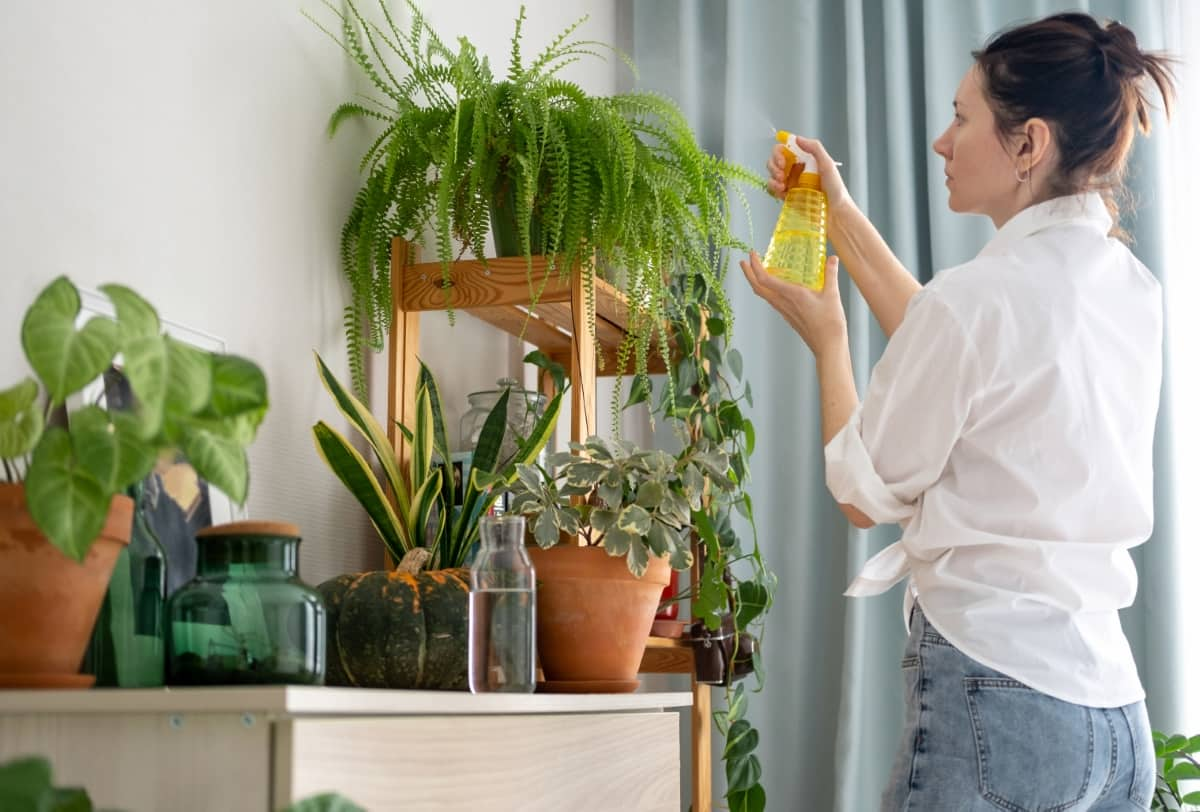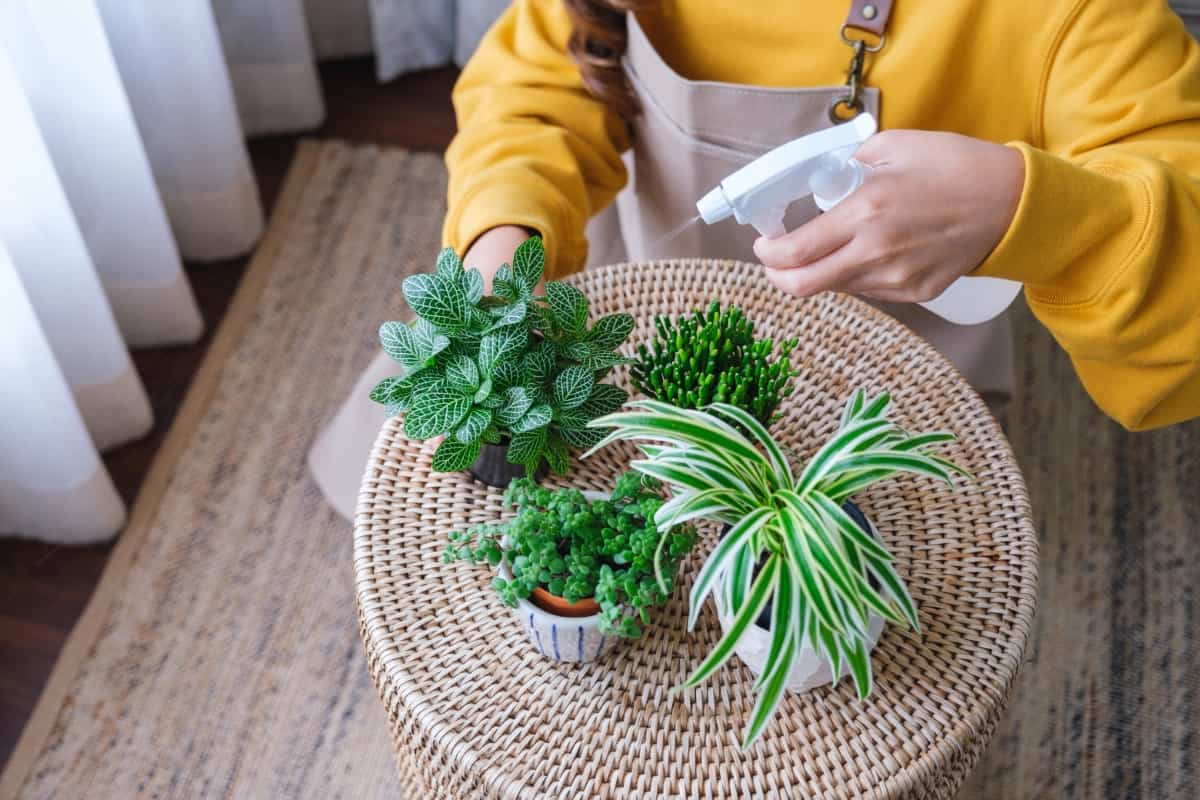Houseplant pests can be a persistent nuisance, compromising the health and beauty of your indoor greenery. In this guide, we explore effective and eco-friendly solutions for controlling houseplant pests through DIY homemade sprays. Discover simple yet potent homemade sprays crafted from readily available ingredients, providing a safe and sustainable way to bid farewell to pests and restore your houseplants to their thriving, pest-free glory.

How to Get Rid of Houseplant Pests with Homemade Sprays
Understand Common Houseplant Pests and Their Damage
- Aphids, tiny insects that feed on plant sap, weaken plants by depriving them of nutrients and can transmit diseases.
- Spider mites, barely visible, create webbing and suck the cell contents from leaves, leading to discoloration and stippling.
- Scale insects form protective shells on plant surfaces, feeding on sap and causing yellowing.
- Mealybugs, cotton-like pests, extract sap and excrete honeydew, promoting mold growth.
- Fungus gnats infest soil, damaging plant roots and facilitating fungal diseases.
Identify the Signs of Pest Infestation on Houseplants
- Yellowing or distorted leaves may indicate aphids or spider mites feeding on plant sap.
- Sticky residue, known as honeydew, signals the presence of pests like mealybugs or scale insects.
- Distinct webs on leaves suggest spider mite activity. Wilting or stunted growth may result from root damage caused by fungus gnats or other soil-dwelling pests.
- Abnormal spots or discoloration could result from various pests, affecting overall plant health.
- Regularly inspect the undersides of leaves, stems, and soil for pests or their traces, enabling early detection and targeted treatment to safeguard houseplants from potential damage.
Natural Remedies for Controlling Houseplant Pests
Neem oil, derived from the neem tree, acts as a potent insecticide and repellent, disrupting pests’ life cycles. Insecticidal soaps from natural fatty acids effectively control soft-bodied pests like aphids and mites. Introducing beneficial insects, like predatory mites or ladybugs, helps keep pest populations in check.
Diatomaceous earth, a powdery substance, damages pests’ exoskeletons, leading to dehydration and death. Additionally, a mixture of water and mild dish soap can be used to wash off certain pests from plant surfaces. Regularly wiping leaves with a damp cloth and maintaining optimal plant hygiene contribute to a healthier environment, minimizing the need for chemical interventions.
Make Homemade Sprays to Eliminate Houseplant Pests
Create effective homemade sprays with simple ingredients to eliminate houseplant pests. Mix neem oil (1 teaspoon) and a few drops of dish soap liquid with water in a spray bottle for aphids and mites. This disrupts pests’ feeding and reproduction. For a general insecticidal spray, blend garlic cloves, hot peppers, and water, then strain before spraying on plants.
In case you missed it: DIY Oregano Oil Spray for Houseplant Pests: Homemade Natural and Organic Bug Control Recipe

A solution of equal ratios of water and white vinegar can deter ants and other pests. For fungal issues, mix baking soda and water to create a spray. A mild soapy water solution (1 teaspoon of soap per liter) is effective against various pests. Regular application of these homemade sprays helps control pests and maintain thriving houseplants.
Use Essential Oils to Repel Houseplant Pests
Harness the power of essential oils to repel houseplant pests naturally. Create a potent repellent by mixing neem oil (10 drops), tea tree oil (5 drops), and eucalyptus oil (5 drops) with water in a spray bottle. Neem oil disrupts pests’ life cycles, while tea tree and eucalyptus oils act as strong repellents.
Alternatively, a blend of peppermint oil (10 drops), rosemary oil (5 drops), and water can deter pests and add a pleasant aroma. Spray these solutions on plant surfaces, focusing on the undersides of leaves, to discourage pests like aphids and mites. Regular application provides a natural and aromatic defense, promoting a pest-free environment for your houseplants.
Herbal Solutions for Houseplant Pest Control
Employ herbal solutions for effective houseplant pest control. Create a garlic and mint spray by blending garlic cloves, leaves, and water, then straining the mixture. This acts as a natural deterrent for various pests. A chamomile tea solution, brewed and cooled, can be applied to control fungal issues and repel pests.
A mixture of equal parts water and thyme essential oil is an effective insect repellent. Rosemary and basil plants strategically placed around other houseplants act as natural pest repellents due to their aromatic properties. Embracing these herbal remedies helps combat pests and adds a touch of botanical diversity to your indoor garden.
DIY Neem Oil Sprays for Houseplant Pest Management
Craft DIY neem oil sprays for efficient houseplant pest management. Mix one teaspoon of neem oil with some mild dish soap liquid in a quart of water to create an essential neem oil spray. Shake well and spray on affected plants, targeting pests like aphids and mites. For a more enhanced solution, combine neem oil with other essential oils (tea tree or eucalyptus) (5-10 drops each) for added repellent properties.
In case you missed it: DIY Eucalyptus Oil Spray for Houseplant Pests: Homemade Natural and Organic Bug Control Recipe for Gardens

Ensure thorough coverage, including the undersides of leaves. Apply regularly, especially after watering, to disrupt pests’ life cycles and keep your houseplants healthy. This natural approach minimizes synthetic pesticides, promoting a safer environment for plants and inhabitants.
Vinegar-Based Sprays for Deterring Houseplant Pests
Utilize vinegar-based sprays as effective deterrents for houseplant pests. Mix a solution of equal ratios of water and white vinegar to create a general-purpose pest repellent. This mixture is beneficial against ants and other crawling insects. For a broader approach, incorporate essential oils like peppermint or citrus (10-15 drops) into the vinegar solution, enhancing its pest-repelling properties while leaving a pleasant scent.
Apply the spray directly on affected areas, focusing on entry points and infested plant parts. The acidity of vinegar disrupts pests’ trails and hampers their feeding. Regularly using these vinegar-based sprays is a natural and eco-friendly strategy to deter and manage common houseplant pests.
Garlic and Pepper Solutions for Houseplant Pest Prevention
Create garlic and pepper solutions to prevent houseplant pests naturally. For a garlic spray, blend a few cloves with water, strain the mixture, and add a few drops of dish soap. This concoction, rich in allicin, acts as a potent pest deterrent. Alternatively, make a pepper spray by steeping hot peppers in water, straining, and adding a bit of liquid soap.
The capsaicin in peppers repels pests effectively. Combine both solutions for added potency, applying on plant surfaces, especially the undersides of leaves. This holistic approach provides a powerful barrier against pests, promoting a healthier environment for your houseplants without using synthetic chemicals.
Maintaining Healthy Soil and Plant Care Practices to Prevent Pests
Start with well-draining soil to discourage waterlogged conditions, as this reduces the risk of root-dwelling pests. The soil should be allowed to dry out between waterings to deter fungus gnats and mold. Regularly inspect and clean plant containers, removing debris and old mulch to eliminate potential hiding spots for pests.
In case you missed it: DIY Horticulture Oil Spray for Houseplant Pests: Homemade Natural, Organic Bug Control Recipe

Ensure proper plant spacing to improve air circulation, minimizing conditions conducive to pests. Introduce beneficial insects like ladybugs or predatory mites to control pest populations naturally. Finally, practice good hygiene by promptly removing any dead or decaying plant matter, reducing the likelihood of attracting pests.
Conclusion
In conclusion, DIY homemade sprays offer an effective and natural solution for controlling houseplant pests. Regular application and healthy plant care practices ensure a pest-resistant environment. Embracing these DIY approaches safeguards your houseplants and promotes a sustainable and eco-friendly approach to indoor gardening.
- Feed Your Flock for Less: Top 10 Tips to Save on Chicken Feed
- Ultimate Guide to Ossabaw Island Hog: Breeding, Raising, Diet, and Care
- Hatching Answers: The Top 10 Reasons Your Chickens Aren’t Laying Eggs
- Eggs and Economics: Breaking Down the Cost of Raising Backyard Chickens
- Defend Your Greens: Proven Methods to Keep Iguanas Out of Your Garden
- Ultimate Guide to Cinnamon Queen Chicken: A Comprehensive Guide for Beginners
- Ultimate Guide to California Tan Chicken: Breeding, Raising, Diet, Egg-Production and Care
- Ultimate Guide to Marsh Daisy Chicken: Breeding, Raising, Diet, and Care
- 10 Types of Chicken Farming Businesses You Can Start for Profits